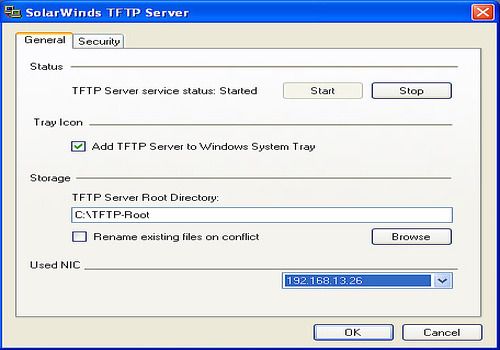

- Tftp server testen how to#
- Tftp server testen full#
- Tftp server testen windows 10#
- Tftp server testen windows 7#
Make a new entry on the list as Port (69) > UDP > IP Address (your IP) Generally, most routers have it under Advanced Setup > NAT > Port Forward. Configuring Port Forwarding This varies from router to router.To allow TFTP requests from remote TFTP clients into your LAN, you will need to log into the router and forward the UDP port 69 to the IP address of your server. Port Forwarding is a setting in the local router that redirects requests from IP address and port number from WAN to another service on the LAN. But if TFTP clients are located across the WAN, they need their traffic to be forwarded to the correct destination. Port forwarding TFTP clients might be able to access the server within the local network area without any issues, so if you don’t need remote file transfers, skip the port forwarding.Since you are configuring a TFTP server, you’ll need to have a folder storing all transferable files, such as OS firmware, configuration files, DCHP, etc. Have a Root Folder Ready In the end, the idea of using TFTP is to transfer files.Have Admin Rights Setting a TFTP server requires an administrator account.

Download SolarWinds Free TFTP Server from its official site.
Tftp server testen windows 7#
You'll need the following post if you're looking for a TFTP client for Windows 7
Tftp server testen windows 10#
Preparing your TFTP EnvironmentĪ TFTP server is a must-have piece of software in every network admin’s toolkit.Ĭisco, Huawei, Netgear, and many more network appliances use TFTP for upgrading, backing-up, and saving configuration files and firmware.įortunately, you can set up and configure a TFTP server on your Windows 10 machine. It does not provide a login or access control mechanism, so it is more common in LANs. It is also used for network booting by diskless nodes that need booting from the LAN.

Today TFTP is commonly used for transferring configuration files and firmware images from and to networking devices. The host can also send a Request to Read (RRQ) then the server sends the data and waits for an acknowledgment. TFTP uses a client/server communication model.Īs as you can see from the message exchange below, the TFTP server sends a block of data and waits for the acknowledgment before sending the next one.Ī host sends a Request to Write (WRQ), the server responds with an Acknowledgement (ACK), so the host sends data.
Tftp server testen full#
These disk-less workstations usually do not have access to the full TCP/IP stack, so they need to obtain configuration information such as DHCP or BOOTP from another server. The original idea of creating TFTP was to provide booting for disk-less computers or workstations that didn’t have enough memory or disk. It provides zero control and has low overhead. TFTP only allows unidirectional file transferring. Instead of using the full TCP implementation, TFTP relies on the connectionless and simple UDP transport over port 69. It attempts to over-simplify and downsize the functionality of FTP. TFTP (Trivial File Transfer Protocol) is a simple file transferring mechanism developed as a “lighter” version of FTP.
Tftp server testen how to#
We’ll learn how TFTP works, and how to set it up on the client and server. In this step-by-step tutorial, you’ll learn how to set up and configure TFTP on Windows 10. Of course, having no overhead is terrific, but there is a downside it does not provide any encryption and authentication mechanisms.Īlthough TFTP has no built-in security, network admins use it for simple and fast file transfers within LANs.Īnd best of all, it can be used for remote connections by hardening its security with the right server/client software. TFTP is simple on its own and does not need any sophisticated messaging to work. Network admins use TFTP Servers every day to transfer images, configuration files, firmware, etc.


 0 kommentar(er)
0 kommentar(er)
